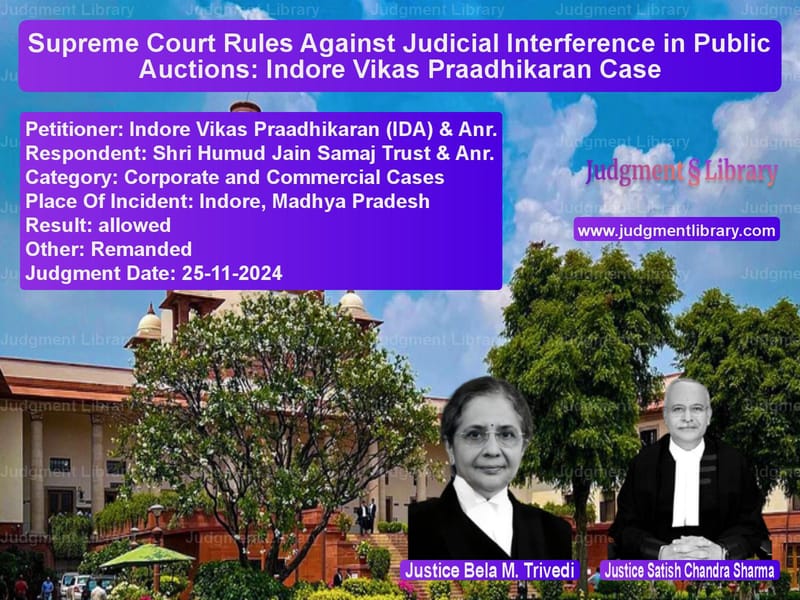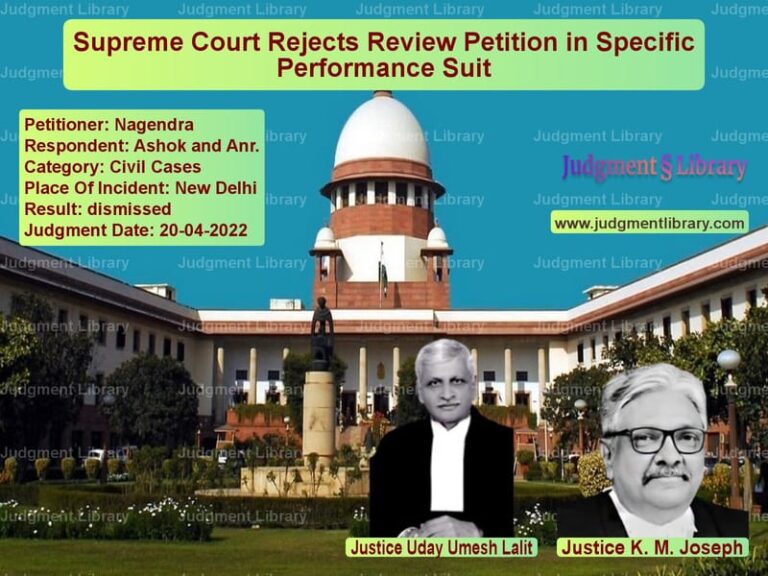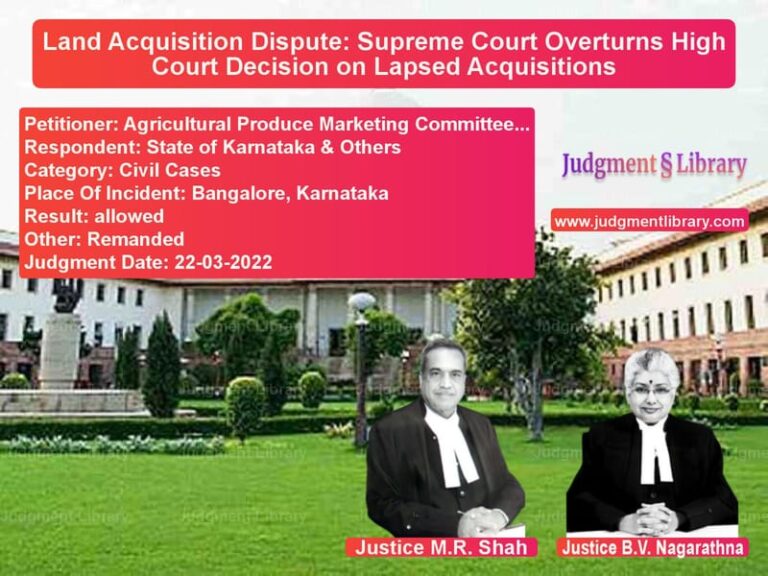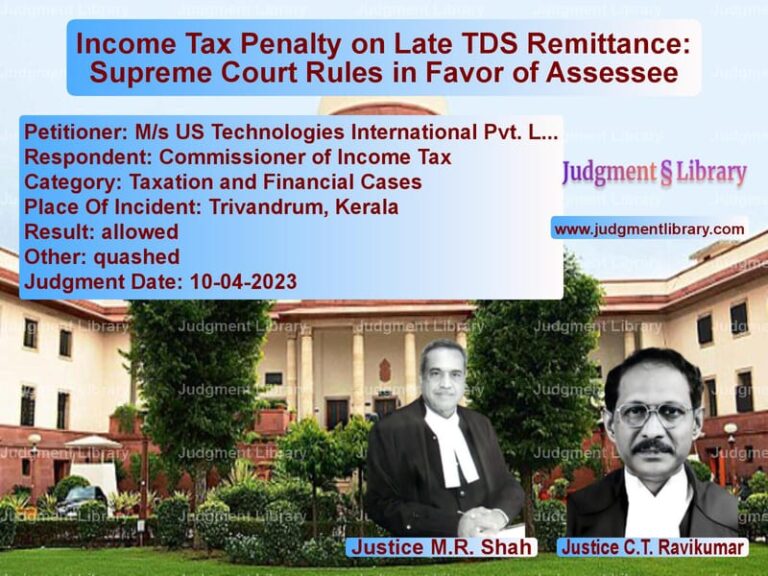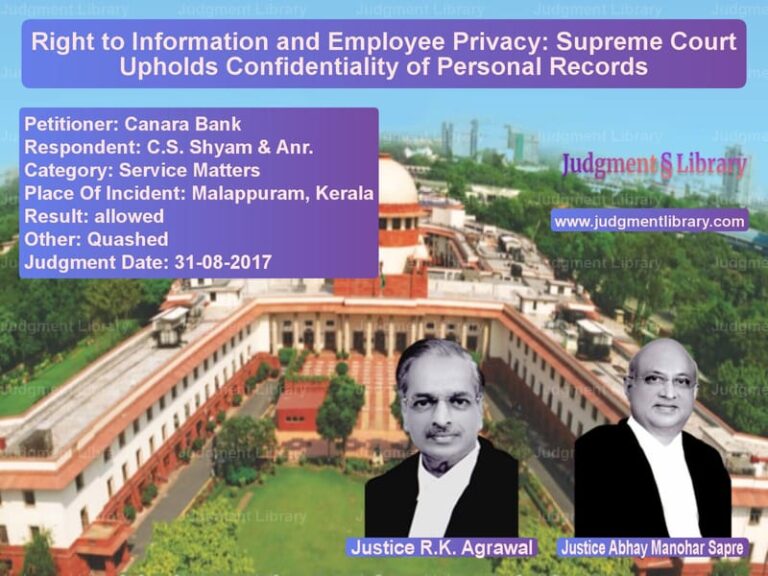Supreme Court Rules Against Judicial Interference in Public Auctions: Indore Vikas Praadhikaran Case
The Supreme Court of India recently delivered a significant ruling in Indore Vikas Praadhikaran (IDA) & Anr. v. Shri Humud Jain Samaj Trust & Anr., addressing the issue of judicial interference in government auction processes. The ruling reaffirmed that courts should not interfere in auction proceedings unless arbitrariness or mala fide intent is clearly established.
Background of the Case
The case arose from a land auction conducted by the Indore Development Authority (IDA). On July 17, 2020, IDA issued a Notice Inviting Tender (NIT) for leasing a 3,382 sq. meter plot at a base price of ₹21,120 per square meter. Three bids were received, with the highest offer from Shri Humud Jain Samaj Trust at ₹25,671.90 per square meter.
However, IDA later discovered that a property tax liability of ₹1.25 crore had not been factored into the reserve price. Consequently, the IDA board decided to cancel all bids and reissue the tender with a revised reserve price of ₹26,000 per square meter.
The highest bidder, Shri Humud Jain Samaj Trust, challenged the rejection of its bid and the issuance of a fresh NIT before the Madhya Pradesh High Court. While the single-judge bench dismissed the challenge, the Division Bench overturned the decision, directing IDA to allot the land to the Trust at ₹26,000 per square meter.
Supreme Court’s Observations
The Supreme Court analyzed the validity of the High Court’s intervention in the auction process. Key observations included:
- A bidder does not acquire a vested right merely by submitting the highest bid.
- Public authorities have the right to cancel or reissue tenders for valid reasons, including financial prudence.
- Judicial interference in auctions should be minimal unless there is clear evidence of arbitrariness or bias.
- The IDA acted within its rights by canceling the initial auction to correct an error in the reserve price.
The Court stated:
“The government has the right to refuse the highest bid in an auction if it deems it necessary in the public interest. Judicial intervention in such decisions must be exercised with extreme caution.”
Key Arguments by the Parties
Petitioners’ Arguments (Indore Development Authority):
- The auction process was annulled to correct an oversight regarding property tax liability.
- Condition No. 6 of the NIT explicitly allowed IDA to reject any or all bids.
- The highest bidder had no vested right to demand land allotment.
- The High Court overstepped its jurisdiction by directing the allotment of land at a fixed price.
Respondents’ Arguments (Shri Humud Jain Samaj Trust):
- The Trust was the highest bidder and should have been allotted the land.
- The cancellation of the auction lacked transparency and fairness.
- IDA acted arbitrarily by issuing a fresh tender without giving the highest bidder a chance to match the new reserve price.
- The Trust was willing to match the revised base price, proving its bona fides.
Supreme Court’s Final Judgment
The Supreme Court ruled:
- The High Court’s direction to allot land to the Trust at ₹26,000 per square meter was unwarranted.
- The IDA was justified in canceling the auction to correct the pricing error.
- Auction authorities must be given the freedom to act in the best financial interests of the public.
- A fresh auction must be conducted, and the Trust may participate under the new terms.
The Court emphasized:
“Judicial review of auction processes must be limited to ensuring fairness and transparency. Courts should not substitute their own decisions for those of public authorities unless arbitrariness is evident.”
Read also: https://judgmentlibrary.com/legal-implications-of-the-byjus-insolvency-case-a-supreme-court-review/
Impact and Significance
The ruling reinforces the autonomy of public authorities in conducting auctions. Key takeaways include:
- Courts should not direct the allotment of public land through judicial orders.
- Public authorities can cancel auctions for valid reasons, including financial considerations.
- Bidders have no absolute right to be allotted land even if they submit the highest bid.
- Governments must ensure transparency but retain discretion in decision-making.
Conclusion
The Supreme Court’s ruling in this case upholds the principle that courts should not interfere in public auctions without clear evidence of wrongdoing. By allowing IDA to conduct a fresh auction, the judgment ensures that public resources are allocated transparently and in the best financial interest of the government. This decision will serve as a precedent for similar cases involving government tenders and auctions.
Petitioner Name: Indore Vikas Praadhikaran (IDA) & Anr..Respondent Name: Shri Humud Jain Samaj Trust & Anr..Judgment By: Justice Bela M. Trivedi, Justice Satish Chandra Sharma.Place Of Incident: Indore, Madhya Pradesh.Judgment Date: 25-11-2024.
Don’t miss out on the full details! Download the complete judgment in PDF format below and gain valuable insights instantly!
Download Judgment: indore-vikas-praadhi-vs-shri-humud-jain-sama-supreme-court-of-india-judgment-dated-25-11-2024.pdf
Directly Download Judgment: Directly download this Judgment
See all petitions in Company Law
See all petitions in Corporate Compliance
See all petitions in unfair trade practices
See all petitions in Public Interest Litigation
See all petitions in Legislative Powers
See all petitions in Judgment by Bela M. Trivedi
See all petitions in Judgment by Satish Chandra Sharma
See all petitions in allowed
See all petitions in Remanded
See all petitions in supreme court of India judgments November 2024
See all petitions in 2024 judgments
See all posts in Corporate and Commercial Cases Category
See all allowed petitions in Corporate and Commercial Cases Category
See all Dismissed petitions in Corporate and Commercial Cases Category
See all partially allowed petitions in Corporate and Commercial Cases Category

